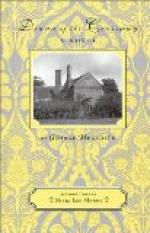Her saying that ’A woman in the pillory restores the original bark of brotherhood to mankind,’ is no more than a cry of personal anguish. She has golden apples in her apron. She says of life: ’When I fail to cherish it in every fibre the fires within are waning,’ and that drives like rain to the roots. She says of the world, generously, if with tapering idea: ’From the point of vision of the angels, this ugly monster, only half out of slime, must appear our one constant hero.’ It can be read maliciously, but abstain.
She says of Romance: ’The young who avoid that region escape the title of Fool at the cost of a celestial crown.’ Of Poetry: ’Those that have souls meet their fellows there.’
But she would have us away with sentimentalism. Sentimental people, in her phrase, ‘fiddle harmonics on the strings of sensualism,’ to the delight of a world gaping for marvels of musical execution rather than for music. For our world is all but a sensational world at present, in maternal travail of a soberer, a braver, a brighter-eyed. Her reflections are thus to be interpreted, it seems to me. She says, ‘The vices of the world’s nobler half in this day are feminine.’ We have to guard against ’half-conceptions of wisdom, hysterical goodness, an impatient charity’—against the elementary state of the altruistic virtues, distinguishable as the sickness and writhings of our egoism to cast its first slough. Idea is there. The funny part of it is our finding it in books of fiction composed for payment. Manifestly this lady did not ‘chameleon’ her pen from the colour of her audience: she was not of the uniformed rank and file marching to drum and fife as gallant interpreters of popular appetite, and going or gone to soundlessness and the icy shades.
Touches inward are not absent: ’To have the sense of the eternal in life is a short flight for the soul. To have had it, is the soul’s vitality.’ And also: ’Palliation of a sin is the hunted creature’s refuge and final temptation. Our battle is ever between spirit and flesh. Spirit must brand the flesh, that it may live.’
You are entreated to repress alarm. She was by preference light-handed; and her saying of oratory, that ’It is always the more impressive for the spice of temper which renders it untrustworthy,’ is light enough. On Politics she is rhetorical and swings: she wrote to spur a junior politician: ’It is the first business of men, the school to mediocrity, to the covetously ambitious a sty, to the dullard his amphitheatre, arms of Titans to the desperately enterprising, Olympus to the genius.’ What a woman thinks of women, is the test of her nature. She saw their existing posture clearly, yet believed, as men disincline to do, that they grow. She says, that ’In their judgements upon women men are females, voices of the present (sexual) dilemma.’ They desire to have ‘a still woman; who can make a constant society of her pins and needles.’




